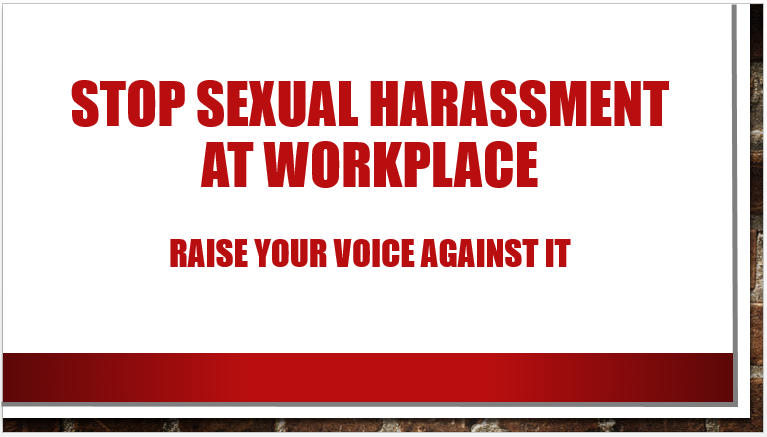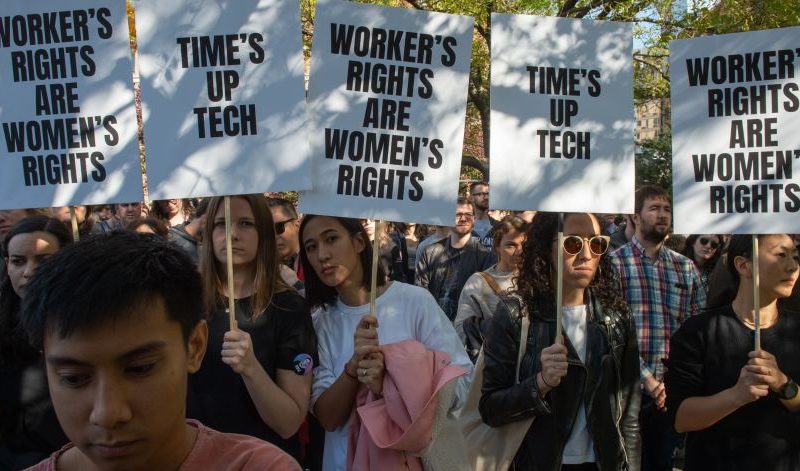Sexual harassment in workplaces are rarely handled in the right direction in spite of policies in place. While IT companies, banks boast of presence of redressal mechanisms and policies to oversee sexual harassment complaints, it is essential to understand how such cases are handled, how employees are empowered with the knowledge of the procedures. Employees who complaint of harassment are often made the victims and it defeats the very objective of having a redressal mechanism.
In 2013, Ramya* had joined TCS as an IT analyst and worked up to become an Associate Consultant in 2019. In 2017, she was deputed as Automation Lead for an onsite project in UK. She had to report to a Quality Manager of TCS who lived in UK with his family. He was also responsible for appraising her performance onsite.
Ramya was undergoing personal problems and was under immense stress. Her manager posed to be friendly and caring. In 2018, during the Office New Year Party the Manager’s behavior created a discomfort to Ramya and thereafter she maintained caution and distance from him.
In March, 2018, the manager had called Ramya for a one-on-one appraisal meeting at 7 PM. Despite voicing her reservations to meet for an unscheduled meeting at such late hours, he insisted on having the meeting. Ramya was forced to attend the meeting which went on till 11 PM. She was already in a state of frail health and immense stress. The Manager went on with his irrelevant questions, moved towards her and touched her inappropriately. She immediately left the room and started walking. He followed her and kept asking why she was leaving. He kept intimidating her and said that she cannot talk/do anything against him. She was overcome by shock and kept walking towards her cabin. Because of all the stress she was put through, she collapsed in her desk and later helped by a colleague.
This incident had put her off with shock and she was worried about the appraisal rating that had to be given by the Manager. After a week, she reported to TCS saying she was made to sit through a late evening unscheduled appraisal meeting. She was worried about the stigma associated with sexual harassment and chose not to reveal it. The complaint was taken and she was promised a reply on her grievance, but she did not receive any reply putting her under even more stress which led to her resignation. She was later informed by the management that they will resolve her grievance. She also informed the onsite HR about the sexual harassment for which she was asked to raise the grievance with TCS Chennai. She filed a grievance complaint with all the details and left UK on completion of her assignments. The grievance filed by her was closed with comments stating that an unscheduled meeting was not necessary on part of the Manager.
The Manager continued to harass her at work place and influenced other managers and HR in the respective vertical. She was put through a lot of stress and requested to change the vertical.
Despite her being a high performer and previously having received A or B band in appraisal, she received a C band from the Manager. He had given appreciations just before the appraisal and had suddenly given comments that she needed improvement in performance. She gave her objection to the appraisal, but it was not taken seriously by her seniors.
In spite of moving to another vertical, she faced unnecessary issues caused by him. One of her colleagues to whom the Manager had confessed of his inappropriate behaviour, went on to tell her that she should maintain cordial relationship with the Manager and she cannot take any action against him. All this had an impact on her health and she decided to quit her job. She was called for a discussion where her superiors asked her to file a sexual harassment complaint. This discussion had given her courage to proceed with the Sexual Harassment complaint to Internal Complaints Committee (ICC)
Ramya filed a written complaint with details and witnesses under the guidance of a HR officer. She was not informed of the time limit (3 months of the incident) within which a complaint should be filed. The complaint given went unnoticed for a month and she became more anxious by the actions of the ICC. Ramya’s mother had to meet the HR head and inform on the deteriorating health of her daughter to which a Committee with 3 members was set up to address the issue.
The Committee failed to address the issue as it was supposed to and the entire enquiry process was flawed and biased.
- Firstly, Ramya was not guided through the process and was never informed of the interim remedies available during the time of inquiry. She had to struggle between attending inquiry proceedings and her routine workload while she had the option of availing paid leave which was not informed by the ICC. It also denied assistance of any external NGO/social worker. Section 10 of Sexual Harassment of Women at Workplace Act 2013 gives an option for conciliation, which the ICC failed to inform Ramya.
- Despite sexual harassment against the Manager, he was not restricted in any front and continued to frequent the workplace and intimidate Ramya. This also put the evidences/witnesses put forth by Ramya to be distorted, tampered or influenced by him. By not making suitable recommendations to restrain or transfer the manger, the ICC failed to exercise statutory power of section 12 under 2013 Act.
- In the continuing mishaps of the ICC, it went on to hand over an unsealed envelop to the HR, asking them to pass it to Ramya. This is a grave breach of confidentiality and ICC can be penalized for the same.
- Ramya was asked to name witnesses for which she had provided the names of her colleagues and her mother. The documents she provided were discarded carelessly. She was not informed about the enquiry conducted with the witnesses she had provided. Also, the Committee denied to consider her mother as an evidence citing that her mother is not an employee.
- The response given by the Manager for the complaint was not informed to her. She had to request for the same which was also denied. She was kept totally uninformed about the documents submitted by the Manager or his enquiry proceedings. This denied her the rights to counter or comment on the evidences provided by him.
- The Manager made contradicting statements to his previous statements on arranging 2 taxies on that day incident happened but it was not given the necessary attention and the ICC ignored it. Since Ramya was not made to examine the documents produced by him, it went unchallenged.
- While the ICC denied Ramya’s mother as an evidence they accepted the manager’s wife as an evidence.
- The ICC did not take much effort to look in to the CCTV footage of the place of harassment.
- The ICC denied its procedural lapses and went on to put a report which wholly blamed Ramya for the incident.
- The following are the statements put forth by ICC:
- They blamed Ramya that she was more concerned about appraisal and performance rating while the fact is that she was concerned about the Sexual Harassment and the rating. The ICC did not take in to account the conflicting ratings given by the Manager in a matter of few weeks.
- One of the ICC member stated that Ramya was not aware of the performance system and she should learn it. By making such crass statements questioning a well performing employee further let her down.
- The ICC went on to character assassinate and use misogynist terms such as “hysteric”.
- It also blamed Ramya for not confronting the Manager with the complaint, while she was kept in the dark the whole time of his enquiry.
- The ICC made unwarranted claims that Ramya failed to uphold the confidentiality. While it was the committee which breached the confidentiality clause.
- The Committee which should have provided the necessary support and strength to Ramya let her down, questioned her, assassinated her character and was clearly biased. It is the fear of being let down that many employees do not take up sexual harassment complaints to the management. The Committee has terribly failed to perform its duties. It is the responsibility of an ICC to empower employees with the information on various procedures, legal clauses with respect to Sexual harassment complaints.
FITE in solidarity with woman employee and extends all the support to her in fighting against the biased ICC inquiry proceedings.
FITE Team










